|
Judy Mollen Walters is the author of seven novels about strong women struggling to help their families and themselves. Her latest book, The In-Between Place, was released on March 19, and can be found on Amazon. In her spare time, Judy likes to spend time with her family, bake, and read. She lives in New Jersey with her husband and pet rabbit.  I still remember my father coming into the classroom. It was around noon on an ordinary Saturday, and I had been in the rec center at a Creative Writing class for about an hour. I’d been going there for a few weeks and I liked so much about it. The teacher was nice and all the kids just wanted to write stories, like me. I was nine years old. The teacher pulled my father aside, but I overheard anyway. “I asked the kids to write a story making an inanimate object become animate,” she said, “and most of them chose the usual things. Your daughter, though, she chose to use George Washington’s wig. She has real talent.” I don’t recall how my father responded or if he responded at all. I just remember feeling very proud. I was in fourth grade then, and had realized I would never, ever be good at math or science and was sort of average in most other subjects. But this writing thing – this I could do. Growing up, I didn’t have allusions of a career as a novelist. I knew what I had been told – you can’t make a living as a novelist. So, for a while, as a teenager, I thought I would be a photojournalist for Life magazine. Of course, I didn’t have the photography skills, nor was I interested in learning them. When I left high school, I went into college a student with no major and no idea what I wanted to do. After a semester in college, I declared English as my major. I loved to read and write. I discovered, through an internship, that I could have a role in publishing. I could put together other people’s books. I could meet authors. I could work at some of the best publishing houses in the country. After college I got a job in real publishing. Through several stints as an editor and then as a Managing Editor for various small publishing companies, I realized, with great dismay, that the business of publishing was not for me. By then I was the mother of a three-year-old with another on the way. My husband and I discussed it and hoped that if we were really careful with money, I could be a Stay-at-Home Mom for a while, which I wound up doing for nineteen years, until my kids left home. Writing never left me, though. When my girls were in school, sometimes I would write. I was the one who wrote and edited the PTO newsletter. I always had an idea for a story in my head. Without noticing, I wrote a novel. It was so bad. I laugh now at how bad it was. At the time, of course, I thought it was fabulous. When I showed it to a couple of people in the business, I learned it was not. I wrote another good three or four books before I wrote the one I thought was good enough for the world to see. That became my “first” book, Child of Mine. Since then I’ve published six more books, one a year, each spring. My books are about strong women struggling in their families with real problems – serious medical issues, career struggles, divorces, family divides. My latest book, just published on March 19, is The In-Between Place. It’s the story of a mother who finds out her four-month-old son has a terminal illness called Spinal Muscular Atrophy, considered the ALS of children. He’s supposed to die by the age of two but mysteriously lives on for many more years. How does this mother balance caring for him while raising his sisters? How does she manage to hold on, day after day, knowing the end will come, but not knowing when that will be? I like to write about the things we never can imagine happening to us, yet sometimes they do. When they do, it’s all about holding on, about fighting for love over despair. I believe in that. I hope my readers do, too. The In Between Place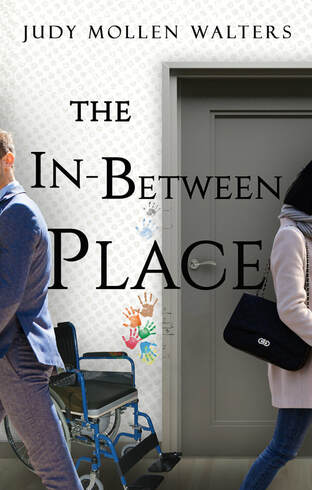 Alice Connelly was headed for the perfect life, with her steady-as-a-rock husband, Ryan, a successful architect, her beautiful, smart toddler daughter, Olivia, and a great career of her own, which she was sure was about to include a promotion and raise.But when Alice has her second child, Oliver, from the beginning, it seems like everything is wrong. At four months, Oliver is diagnosed with a rare condition, Spinal Muscular Atrophy, or SMA, and given only two years to live.But Oliver surprises everyone by[ living much longer than anyone predicted. Although he can’t move any of his muscles, his is brilliant, funny, and takes his limitations in stride. His mother, Alice, has given up her career to care for him, and his sisters, Olivia and Poppy, are forced to pretend he will live forever, even when they know the real truth, while Ryan keeps pushing his raw feelings away, staying disconnected from everyone around him.Filled with surprising twists and turns, The In-Between Place will have you up reading until the wee hours. It makes us ask: How much can one family endure without being shattered and how do you pick up the pieces when life throws too much at you? You’ll laugh and cry and wish for something better for the Connelleys and think about your own family and feel grateful for it. Where to Buy The In Between Place
0 Comments
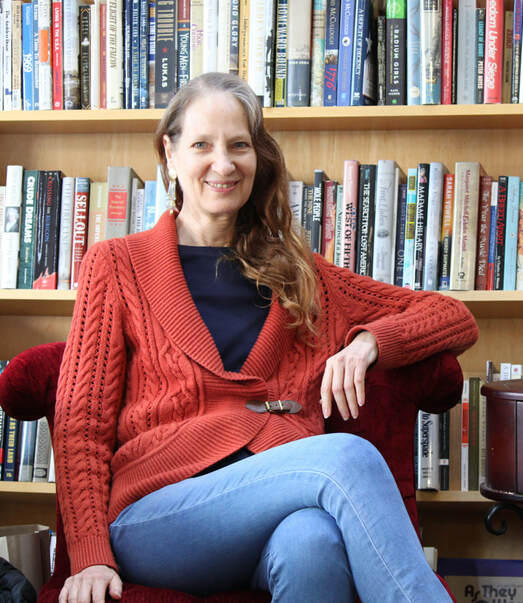 Nanette Littlestone is an award-winning author, editor, publisher, and CEO of Words of Passion. Nanette never knew she wanted to be a writer until she was over forty. But once she began, the ideas didn't stop. She loves to explore relationships and is unceasingly curious about why people do what they do. The themes of her stories focus on love (what we always strive for) and forgiveness (what we always need). Authentic writing comes not from the mind but from the heart. When you embrace your vulnerability, that’s when you truly connect with your readers. A huge fan of food and cooking, Nanette acts as the master chef. Sometimes writing thrills and lifts the soul. Sometimes it’s a lot like chocolate—temperamental. With over 25 years of experience guiding authors to achieve more clarity and authenticity in their writing, Nanette shows you how to turn the elements of your story into a mouth-watering delight. A story that comes from the heart and inspires others. Her books include F.A.I.T.H. - Finding Answers in the Heart, Volumes I and II, the historical novel The Sacred Flame, and the contemporary sequel Bella Toscana. And a new book is in the works, a YA fantasy about healing the heart of the planet. In her spare time, she works with the Conscious Life Journal as Editor in Chief, managing authors and articles for this magazine that helps people journey into higher conscious awareness through the five stages of Mind, Body, Spirit, Integration, and Balance. When I was in high school, my mother suggested that I write stories. She might as well have suggested I be an astronaut. (There were no women in the space program then.) I loved to read voraciously, but writing was an unimaginable concept surrounded by an enormous black void. Sometimes creativity needs forceful encouragement. Fast forward to 1994. I still loved to read. One sunny Saturday afternoon I was sitting on my futon in my bedroom minding my own business when I heard my name. Just my name. No neon sign or burning bush or ferocious clap of thunder. When nothing else happened, I shrugged and let it go. The following week the same thing happened. Ticked off, I yelled, “What? What do you want?” And again, there were no visible signs. But this time I felt a knowing, a sense that I was supposed to write. So I began. I wrote my first novel by hand in nine months. The second novel took less than three months. The third novel took several years. And so on. When I moved to Atlanta in 2002, I committed to a writing career and joined a critique group. I’d never read my writing in public and it was disastrous. I do believe that everyone said something positive, but everyone also said something negative. And, of course, I focused on the negative. After the third person’s critique, my head swam, my eyes blurred, and I couldn’t hear a thing. When the meeting ended I ran to my car and swore I wouldn’t come back. Ever. Two weeks later I returned to the group. The best decision I could have made. Six months later I became the new leader. I continued to write novels but something was missing. A lot, actually. I couldn’t plot worth a darn. All the books I read seemed to come together effortlessly. How did the authors do that? At long last help arrived in the form of a class on plotting. I was working on my historical novel (The Sacred Flame) about a Vestal Virgin and all the love scenes were written but how did I connect them? When the teacher introduced the concept of GMC (Goal, Motivation, and Conflict) I felt an ember glow. We filled out a chart for our major characters with their default behavior, inner motivation, outer and inner goals, and outer and inner conflict. We talked about their wants, their needs, their fears. And over all of this, the teacher told us to use the character’s default behavior to create conflict. Huh? I just didn’t get it. I struggled through the entire class. Every week we would build on the previous week, but the conflict in my story would not gel. Slippery as egg whites, that stuff. In the last week, when I’d run out of hope, another student asked the same question about default behavior and conflict. And suddenly the ember caught flame and began to blaze. If my heroine followed the rules, what could make her do the opposite? If my hero wanted his father’s respect, what would cause his father to reject him? Such a simple strategy when you understand how it works. That revelation blasted open the doors to my creativity and Spirit rejoiced. I had such fun developing untenable situations for my characters, pitting them against each other, creating misunderstandings and slights and jealousy and betrayal, and also finding hope and compassion and forgiveness and love. Since The Sacred Flame, in all my writing and professional editing, I require myself and my clients to fill out a GMC chart. I love to explore relationships and want to know why people do what they do. I want to read about the emotional side of the characters—how do they think, how do they feel, why do they make the decisions they make? I write stories about women because I am a woman and my path in life is challenging and mysterious and enchanting. The more I honor myself with love and respect and compassion, the more I open the way to the bounty the universe is waiting to bestow. So the themes in my stories focus on love (what we always strive for) and forgiveness (what we always need). The theme in The Sacred Flame explores what people would sacrifice for love. The theme in Bella Toscana, the sequel to The Sacred Flame, looks at having the courage to follow your heart. The new story I’m working on, which involves an 18-year-old heroine (Help!, I’ve never written a teen story before), is about healing old pain and fear through love and acceptance. Writing is one of the most thrilling things that I do. When inspiration beckons and the words flow, it’s almost as good as the satisfaction that comes from eating rich dark chocolate. Or maybe better, because the bliss from writing is beneficial for mind, body, and spirit. I’d love to meet Nora Roberts to thank her for inspiring me. Her ability to pack so much into one or two words helped me hone my skill. And I would love to chat with Susan Meissner and Kristin Hannah about story development and research. Their writing is sensitive and heartfelt and so emotionally impressive. Bella Toscana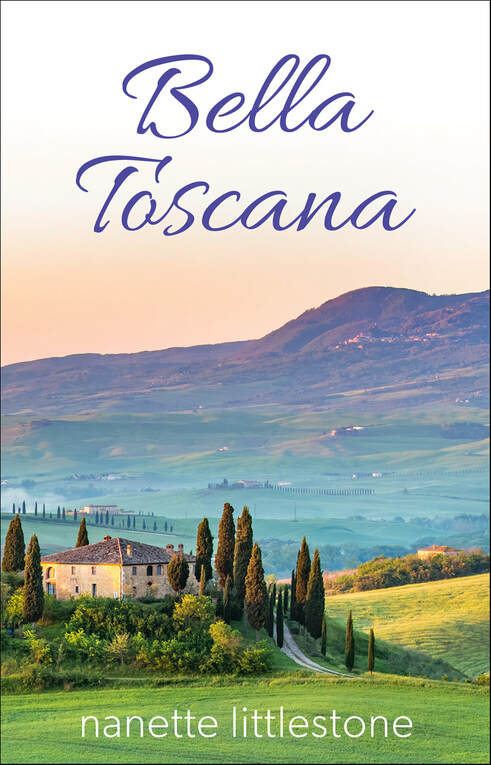 An explosive yearning that can’t be denied. Disturbing visions from an ancient past. A mysterious stranger that somehow feels familiar. On the night of her fiftieth birthday, the comfortable ride of Toscana’s life takes an alarming plunge. Haunted by seductive visions, she tries to push aside the desire and focus on the husband who adores her. Then she falls for Flynn, a younger man with an eye for adventure and a heart full of romance, who leaves her doubting everything she’s believed about love and passion. In Atlanta, Rome, and the lush scenery of Tuscany, Toscana searches for answers to the mysteries of her life while she faces her biggest question. If she listens to her feelings will she lose everything she holds dear, or does her heart hold the key to love and joy? Find Nanette on her website, Goodreads and Facebook! Where to Buy Bella Toscana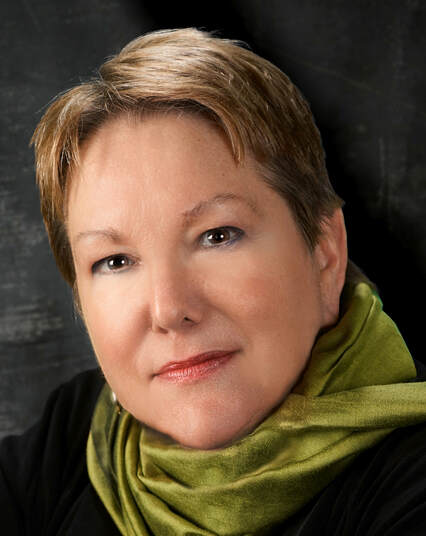 Ginny Fite is the author of the thriller No End of Bad, the dark mystery/thrillers Cromwell's Folly, No Good Deed Left Undone, and Lying, Cheating, and Occasionally Murder, a humorous book on aging, I Should Be Dead by Now, a collection of short stories, What Goes Around, and three books of poetry. An award-winning journalist, her short stories have been published in numerous literary journals. She earned her degrees at Rutgers University and Johns Hopkins University and also studied at The School for Women Healers and the Maryland Institute for Poetry Therapy. She lives in Harpers Ferry, West Virginia. Forty years ago, at a self-actualization seminar, I wrote down three life goals as part of an exercise. I only remember two of those goals: to have all my novels published and have a car that works. There was one main problem with my first goal. I hadn’t written any novels. I was a working poet at the time. A chapbook of my poetry, The Last Thousand Years, had been published as a university prize. My poems were appearing in small literary journals. I could imagine a maximum of fifty words at a time on a page. I write short poems. I like white space around words. The world of work closed around me. For 20 years as a journalist and communicator I wrote news stories, features, press releases, speeches, position papers, and hundreds and hundreds of poems. If you write, then you know that stories ping off everything you hear or see or do, every second-hand observation by a stranger, every moment standing in line listening in on someone else’s conversation, every sudden pop of an idea while you’re washing the dishes. All that time, I was gathering material. But the question of how one made fiction out of one’s own experience baffled me. As far as I could see, there was only so much I could say—like two sentences—about my life that would matter to anyone else. Where did the ideas come from that yielded a novel? A novel needs desire, anticipation, conflict and epiphanies. Even if I understood the three-act structure and how to build to a climax from studying Greek tragedies, how did I translate that to any fiction I would write? But if that little bit of magic–writing down my goal on a piece of paper decades before–has anything to teach me, it’s that something in me already knew there were novels lurking in my brain. Being a journalist taught me how to put more than fifty words on a page. The world of prose—with all its dependent clauses, its multiple lines of inquiry, as well as how editors cut from the bottom—opened to me on pages of newsprint and magazine spreads. It’s possible that if I’d become a journalist in the digital age, with its tiny screens and foreshortened stories, I would never have become a novelist. Still, going from fifty to 800 or even 2,000 words was not as huge a leap as going from there to 70,000 words. I needed another stepping stone. I wrote essays and short stories. Little by little, I wrote a novel—the typical semi-autobiographical work of a novice writer—and rewrote it and rewrote it, and then sent it out to agents and got lovely rejection notes. They told me I wrote beautifully but they weren’t interested in my project. “Project?” I growled. “It’s not a project; it’s a novel!” I tore the novel apart, salvaged what I could, and wrote more short stories. It’s easier on the heart to abandon 2,000 words than it is to let go of 80,000. Rejection makes each word seem worth less than it did when you typed it, but rejection is a constant part of a writer’s life. “You better have a rhinoceros hide,” wrote one kind editor who published a poem. I learned writers are stubborn, and persistent. We write because we write. To breathe. I was still thinking about short stories when Cromwell’s Folly hit me full force as I was driving to the bank. I heard the beginning of that novel in my head as if the story were being told to me by someone the passenger seat. I turned to look at the speaker, expecting to see Detective Sam Lagarde in his tan felt Stetson outback hat, barn jacket and corduroy slacks. He existed only in my imagination. When I got home, I typed down the words he said as fast as I could and waited for the next installment. After years of reading Toni Morrison, Jhumpa Lahiri, and Barbara Kingsolver, the last thing I ever expected to be writing was a murder mystery, and yet here it was, being delivered right into my fingers. All I had to do was tap the keys. Cromwell’s Folly got me an agent. That agent got me a publisher. It still seems like magic. Three more novels followed in quick succession, an experience similar to having quadruplets complete with sleepless nights and lots of messes to clean up. I am now waiting for my publisher’s edits and notes on a new women’s fiction novel, Blue Girl on a Night Dream Sea. [Sneak peek: To save her own life, Elena, a 21st century police commando, must save Hana, who has trekked across Bronze Age Lebanon to prevent a king from destroying her tribe. They’re stronger together. The problem is they’re 4,000 years and 6,000 miles apart.] While I’m waiting, I’m also completely revising a family saga that resists its confines, doing the final edits on a contemporary re-telling of The Ghost and Mrs. Muir, and polishing a novel in which a crotchety old woman prevents a young writer’s suicide and in return asks for a story every day as she’s dying. I’m also seeking a publisher for a novel told in linked short stories. Clearly all those years ago my unconscious was prompting me to listen up. There are a lot of stories that need telling. No End of Bad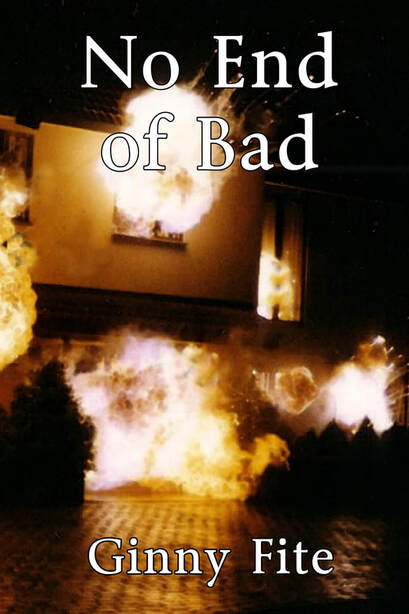 Washington, DC, housewife Margaret Turnbull's world literally blows up after her husband, FBI agent Clay Turnbull, is falsely arrested and killed by agents working for an international drug cartel. Unbeknownst to Margaret, her enemy's tentacles reach all the way to the White House and control senior personnel. Their powerful enterprise in jeopardy, the assassins will stop at nothing to cover their tracks. Even as they grieve, Margaret and her daughter Melissa must learn on the fly how to survive against cutting-edge surveillance and NSA technology when there is nowhere to hide, and no one to trust. No one is safe--anywhere. Find Ginny on her website and Facebook Where to Buy No End of Bad Ryanne Glenn is a member of the Northern Colorado Writers in Fort Collins, CO, where she attends Colorado State University. She is pursuing a degree in Chemical and Biological Engineering with a minor in Biomedical Engineering. She loves to golf, though after playing for twelve years, her handicap should be much lower than it is. Between writing and classes, she often visits her hometown of Fruita, Colorado, to spend time with her family and two dogs, Coco and Pebbles. Ryanne started writing short stories when she was ten and was first published in Fruita’s local newspaper. She took her first creative writing class in high school, and was inspired to expand her writing into poetry and longer stories. After struggling with depression in her first year at college, she turned back to writing as a healthy outlet for her emotions. She wants to write strong female role models and is excited to share her stories with the world. I like to say I’ve always wanted to be a writer. I remember writing short horror stories when I was in fifth grade and creating a little writing club with a few of my friends. We all loved R. L. Stine’s books and were convinced we could be just like him. That of course, did not happen. Shortly after starting middle school, I found out how much I enjoyed math and science. I started taking every science elective I could all the way up to my senior year of high school. But to graduate, you had to take an English elective. I remembered how much I used to love creating stories, and chose creative writing. After that class, I was convinced I was going to be a famous poet. That didn’t happen either. I started college pursuing a degree in Chemical and Biomedical Engineering. I could take my love of all things math and science and turn that into a career. I thought I was well on my way to a solid future with nothing in my way. If you’ve noticed a theme by now, you’ll know that did not happen. After my first few semesters, I found my mood and mental state tank. I developed a major depressive disorder. I barely went to class, I stopped talking to people, I didn’t care if I ate, and I couldn’t sleep. Sometimes, it took all my effort just to get up and get dressed in the morning. My thoughts got darker and darker. The voice in my head screamed at me every minute of every day. You’re not good enough. You’re worthless. You’re a horrible person. You don’t deserve to be here. Why are you still trying? Why are you even alive? Over and over again, I heard this in my mind. I couldn’t make these thoughts go away, I couldn’t mute them, I couldn’t do anything. I thought of suicide every single day. As time passed, I thought about it multiple times a day, and finally, I had made up my mind to make that permanent decision. I’m proud to say that didn’t happen. I started getting the help I needed. With my parent’s support, I started making the change to live a healthier life. My therapist recommended journaling to help rid my mind of all those terrible thoughts. I’m not great at writing out feelings. I didn’t enjoy it and most of the time, I just forgot to do it. But one day, I started writing, not my feelings, but a story. I created a world from a dream I had many years ago. I made a character who had to go through some tough times and come out okay. When I wrote, I could lose myself in a fantasy world and those awful voices in my head shut off. I found that if my characters could go through all these challenges and end up okay, then I could succeed in my own challenges. Now, I still struggle with depression, but it’s under control. At first, I was afraid to talk about what I’d gone through, but I realized that a lot of people face the same challenges I did. By not hiding my experiences, I hope to encourage others to seek comfort and help. And now, I’ve turned my focus to helping others overcome their own issues. I think it’s so important to represent characters and their mental states accurately. I know now that I don’t just want to be a writer. I need to be a writer. Descent of Shadows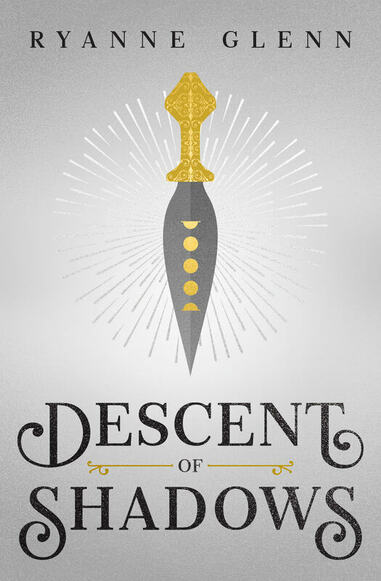 At the heart of her family’s war against the wraith king, Anna makes the only decision she can—to fight back. Humans have always called the land of Istamba home, yet Roland, King of the Wraiths, is intent on claiming it for himself. When Fort Lieay is attacked, thirteen-year-old Anna Lieay is the only survivor. Distraught from the death of her parents, she makes the dangerous journey to the Sanctuary, the last free human settlement. There, she vows to join the army, despite her age, to help save her home from the wraiths and restore peace to humanity. Find Ryanne at her website and Twitter Where to Buy Descent of Shadows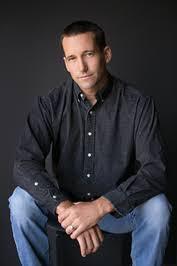 The last ten months have been quite an adventure for me. In that time, I’ve gone from “unpublished author” to “Amazon Bestseller” and “Award-Winning Author.” But the road has hardly been smooth and my path led to an unexpected place. So for any struggling authors out there wondering what the road to “Bestseller” and “Award-Winning” looks like, here’s one view… I started writing fiction in 2001. I didn’t know it at the time, but I was terrible. Fortunately, no one offered to represent me or publish my books (other than vanity presses and scams) so I don’t have to live with the knowledge that my worst writing is out there for people to see. It’s shut tightly away on a floppy disk that can’t even be accessed without specialized, “old school” equipment. Thank God. But I realized I liked writing, so I kept at it. I wrote one manuscript a year, on average, and each had the same abject failure as the prior one for several years running. It wasn’t until 2013 that I finally landed an agent. Oh, happy day!!! All my dreams were about to come true!!! Except they didn’t. After roller-coaster ups and downs, near-misses and deals that fell through, I found four more years had gone by and I still didn’t even have a published book. At that point, I realized something had to change. So I broke things off with my agent to query independent publishers…only to find out most independent publishers these days often don’t accept un-agented submissions. That was a disappointing change from when I’d started writing over a decade earlier. So that left only three options: self-publish, go with a vanity press, or find a “micro-publisher” who would take me on. For those of you not familiar with the term, micro-publishers are usually a small team of people (and often just one person) who agrees to basically pay the costs of self-publishing in exchange for about 75% of the royalties, with the author getting roughly 25%. They make money if the book does even reasonably well, and the writer gets to feel special because he has a publisher. They use Print on Demand technology (which makes it really hard to place in bookstores) and usually don’t have much of a marketing budget. The Big Boys they are not. But I was desperate, so I queried. I was able to get a couple offers from micro-publishers, picked the one that would put the most into promotions, and signed on the dotted line. My expectations were, appropriately, low. And early in the process, they were met right where I set them. I ordered 25 books, and the box arrived looking every bit the part of a rushed, self-published novel. I choked back the tears, disposed of the box in my basement storage area, and forgot about them. I decided this writing thing just wasn’t going to work out. So I moved on with my life. I put the dream of writing behind me and began searching for other things that could replace it. And that’s the path my life would have taken, if it hadn’t been for the Maxy Awards. Let me be clear: the Maxy Awards are not going to be confused with the Nobel Prize for Literature. It’s a tiny contest whose winners were primarily from my micro-publisher. Still, my book was named “2018 Book of the Year.” And that changed everything. We were able to put a gold medal seal on the cover. We got blurbs. The reviews started piling up on Amazon and Goodreads. Somehow, the book began to gain momentum. So I entered it into the American Fiction Awards, and it won first place. Then it was named Finalist in two additional awards and is currently in the semi-final round of two more. Now I had a list of awards won and began approaching bookstores, some of which bought copies. My publisher noticed, put more money into Amazon ads (I pitched in, too) and before we knew it, the book was landing on Amazon’s bestseller list for two different categories of fiction. And yet, there’s still so far to go. The book has won awards, but very small awards. It has landed on bestseller lists, but only for very specific genres. What hasn’t happened yet is sufficient financial success to make writing feel less like a productive hobby and more like an actual career. Will that ever happen? I have no idea. But I do know that I’m closer now than ever before. And that, surprisingly enough, is thanks to my decision to sign with a micro-publisher. It certainly isn’t the only way to go—and it’s not for everyone. But if you find yourself in a similar place as I was in, it’s definitely worth considering. The Five Wishes of Mr. Murray McBride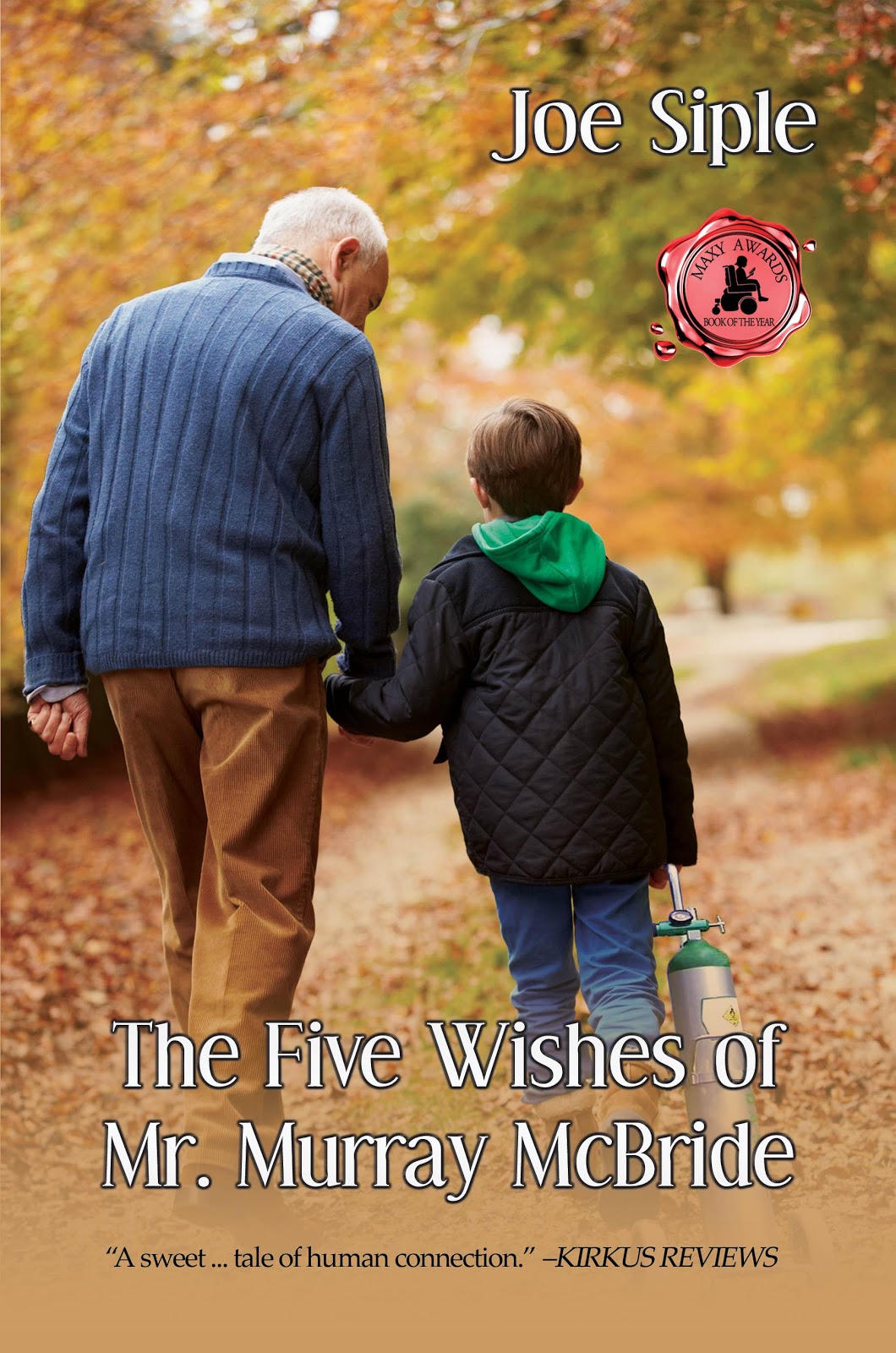 With all his family and friends gone, one-hundred-year-old Murray McBride is looking for a reason to live. He finds it in Jason Cashman, a ten-year-old boy with a terminal heart defect and a list of five things he wants to do before he dies. Together, they race against the limited time each has left, ticking off wishes one by one. But when tragedy strikes, their worlds are turned upside-down, and an unexpected gift is the only thing that can make Jason's final wish come true. Where to Buy The Five Wishes of Mr. Murray McBride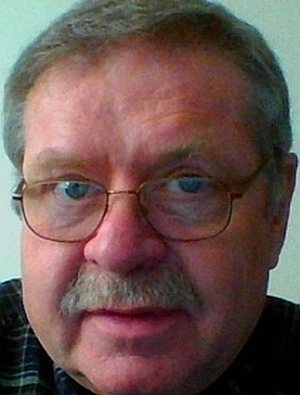 Alan Felyk is a critically acclaimed novelist who spent 40 years working as a newspaper journalist and space industry editor. A University of Colorado graduate, he published a humorous, sometimes wistful memoir, Damaged Right Out Of The Box, in 2012. Six years later he published Damaged Beyond All Recognition, a novel that blends science fiction, romance, and humor. It was nominated for Underground Book Reviews' Novel of the Year Award and won the Literary Titan Book Award. In addition, it received a five-star award from the Readers' Favorite Book Reviews and Awards Contest as well as plaudits from Kirkus Reviews, OnlineBookClub.org, and Bookpleasures.com. He is now working on a sequel to the novel—Damaged And No Longer Under Warranty. He lives in Lakewood, Colorado. I vividly remember watching the first television episode of the Twilight Zone on October 2, 1959. Starring Earl Holliman, it was titled “Where Is Everybody?” and written by Rod Serling. The episode was about a man wearing a U.S. Air Force uniform who inexplicably finds himself in a town occupied only by mannequins. The story ended with an unexpected twist, and I became hooked on the series. It wasn’t long before I started writing short stories that tried to mimic Serling’s imagination. The stories, written by a grade schooler and unworthy of publication, remained unread by others—they were deservedly thrown into the trash went I left home for college. During my senior year in high school, I became hooked on another television show, Rowan and Martin’s Laugh-In. So, when my English teacher, Miss Bronson, asked us to write something creative, I wrote a parody of the show, substituting the show’s characters with school teachers and administrators. I had cast Miss Bronson as the character that Goldie Hawn portrayed on the show—a ditsy, giggling blonde. My teacher loved what I had written—so much so that she read my script aloud to the class. Within short order, the classroom’s atmosphere turned uproarious. As I wrote in my memoir, it was a pivotal moment for me: “… I learned that, with some keystrokes on the typewriter, I could make someone laugh.” In my early twenties, I wrote a short story that drew the attention of the fiction editor at Omni, a science and science fiction magazine. He said he loved my work, but that I was competing for space with authors who were named Isaac Asimov, Ray Bradbury, and Arthur C. Clarke. Instead of focusing on the positive, I focused on the negative. My desire to write yielded to the stress of raising a family and working jobs that often required much more than forty hours per week. At the age of thirty-four, I accepted a job in the space industry, and I ran into a college girlfriend, Sam, who was working at the company as well. I had unceremoniously dumped Sam thirteen years earlier in favor of a previous girlfriend who returned to me. Although I didn’t regret what had happened, I always regretted how it happened. Still, I could bring myself to apologize to Sam, and we worked on several projects together before her untimely death in 2010. Guilty about my failure to make amends to Sam, I decided to make good on a promise I had made to her in college: that I would write a book. So, I decided to write a memoir, and the first section I wrote was my relationship with her. It sparked a piece of advice that I continue to provide to memoir writers: “If you ever consider writing an honest personal experiences book, start with the things that you're not proud of. Then write about the things that hurt the most. If you get past those two things, you'll finish the book—if it isn't already finished.” Despite the story about Sam, the memoir was largely humorous. And after I published the book, I was lost as to what I should write next. I thought about jotting down my satirical observations about an ever-changing world, but the project never gained traction. I still toyed with the idea of writing science fiction short stories, and I dusted off the story I had sent to Omni many years ago. At that time, I had started reading The Sirens of Titan, a comic science fiction novel by Kurt Vonnegut. Not only was his book brilliant, but it seemed to be written in the very style that I had developed over the years. Suddenly, it all made sense. Why not combine the two genres I loved so much? Unconvinced that I could write a full-length novel, I was determined to simply rewrite my short story by adding satire to it. But as I delved back into it, the original storyline began to expand. It was almost as if Vonnegut’s spirit was suggesting plot elements. And, before I realized what had occurred, I was in the middle of a book. Now, I’m writing a sequel to the novel, and I expect a third book in the Infinity’s Trinity Series. If there is a lesson from all this, it’s that aspiring (and perhaps struggling) writers should never call it quits. No one knows when an unexpected spark might ignite the next literary triumph. My biggest regret is that I didn’t find that catalyst decades ago. But my biggest joy is that it did, in fact, manifest itself. I have mulled the possibility of writing a humorous self-help book entitled How To Write A Novel In 50 Years Or More. It would cover the dozens upon dozens of reasons that prevent authors from sitting at a keyboard and sharing their imaginations with the world. Who knows? Perhaps another catalyst for that project will emerge. Hey, Kurt, are you still out there? Damaged Beyond All Recognition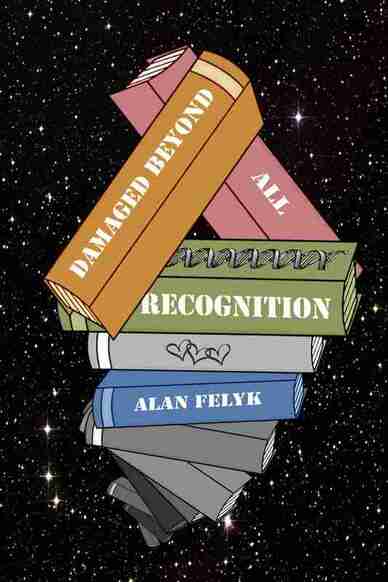 Paul Tomenko is no stranger to the improbable. He became a magazine sweepstakes winner and celebrated counterculture writer by age nineteen. Now, after reaching for a can of Chef Boy-ar-dee spaghetti and meatballs, he’s traveling to and from God’s library somewhere outside the Universe to prevent the end of eternity. Because of a DNA flaw, humanity no longer can ascend through the Planes of Existence after they die. That means no one will have the needed expertise to replace God when He dies. And, to complicate matters, Paul realizes he must enlist the help of his two lovers: Maggie Mae Monahan, a brilliant geneticist who has the uncanny ability to “connect the dots,” and Allie Briarsworth, a novelist who inexplicably senses past and future events in the cosmos. But the trio discovers the preservation of forevermore can turn someone’s soul inside out. Literally. Find Alan on Facebook and Twitter Where to Buy Damaged Beyond All Recognition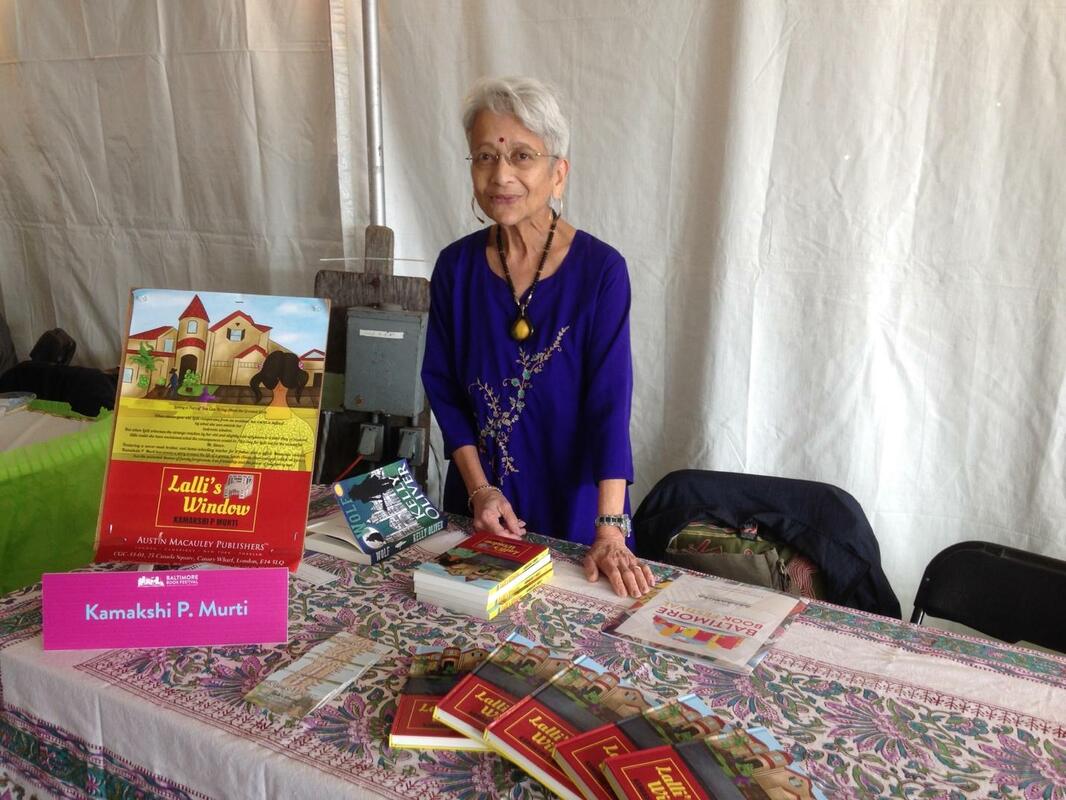 Kamakshi P. Murti is originally from India. She draws inspiration for her story-telling from her background in cultural and gender studies, and even more importantly from the younger members of her family who have empowered her to hone her skills as a story-teller. 1980 was a memorable year. “Publish or perish”? I was baffled by the phrase. I had just moved from India to the US to get a Ph.D. in German Studies. It took fifty-six letters of rejection from publishers for my first scholarly monograph, the work that would make or break me, that defined what ‘perish’ meant. Then Walter de Gruyter in Berlin, Germany, decided to risk it all, and to publish my book with the literally breath-taking title: “The reincarnation of the reader as author: a reception historical investigation of the influence of Indic literature on German writers.” (1990) Two more serious monographs, “India: the seductive and seduced ‘other’ of German Orientalism” (2001) and “To veil or not to veil: Europe’s shape-shifting ‘other’” (2013), and my reputation as a writer and scholar was established. But … yes, there was an irrepressible ‘BUT’ … but what about the storyteller that was bursting at the seams to express herself? There she was, my paternal aunt, telling me “The Tale of the half-boy,” a boy missing an entire half of his body. Like any good storyteller, my aunt made sure the heroic triumphed at the end, and all was well and whole with the world! My aunt the engineer (yes, she was the first female electrical engineer in India, proudly and defiantly getting her degree a year after I was born) gave me the courage to weave my own stories. The non-academic side of me began entertaining nieces, nephews, great-nieces, great-nephews with possible and impossible tales. 2008 was once again memorable. It heralded the second phase of my life: retirement. And retirement brought with it a luxury of which I had only dreamt: the time to write down all those tales with which I had entertained many young people at various levels of growing-up. My archaeologist niece Shanti Pappu was decidedly the inspiration for and firmest critic of my debut novel “Veiled Murders: The Mound of the Dead.” Why this book? The ancient civilizations of Mesopotamia and Egypt figure prominently in mystery fiction. However, the ancient Indus Valley Civilization - 3300–1300 BCE - has fallen by the wayside as a site of murder and mayhem! Strong women in history have always fascinated me, and I wondered if there was a counterpart of the female pharaoh Hatshepsut in the Indus Valley Civilization. I came across the 'Dancing Girl,' a bronze sculpture made approximately 2500 BCE, and displayed in a museum in New Delhi. I thought of her as a priestess queen and gave her the name Sai-an-ki. "Veiled Murders" follows this queen, her dreams and ambitions, her violent death, and the unearthing of her bones 4,500 years later that would bring to light the identity of her murderers. The euphoria of creating my first fictional work evaporated quite quickly, as publisher after publisher returned the dreaded word “NO!” However, my aunt had taught me well. I wasn’t going to give up that easily. A woman who had entertained me through many a rainy day came to mind: Agatha Christie. I was going to create twin avatars of Christie’s ‘fluffy’ Jane Marple. And Leela and Meena Rao, two seventy-year-old cousins, came to life. “Murders Most Matronly” was soon followed by fourteen others in the series! Family and loyal friends praised the characters, avidly read the stories, and pushed me to contact publishers. US publishers continued to say ‘No.’ I turned to India and discovered Juggernaut Books. They published my “Murders Most Matronly” in 2017. It was a second lease on life, a truly exhilarating one! What next? I pondered. Browsing through children’s literature in a local library, I found myself searching for a face, a South-Asian-American face like mine – brown skin and all. The absence of such a face led to “Lalli’s Window,” the story of Lalli, a ten-year old South-Asian-American girl whose parents are first-generation immigrants to the U.S. She loses a leg in a car accident. The story is set in 21st century Tucson, Arizona, and begins after Lalli returns home from the hospital. Great Britain came to my rescue this time. Austin Macauley published “Lalli’s Window” in 2017 – a veritable banner year for my writing! I have since written six more in this series, following Lalli year after year, sensing her many hopes and frustrations, her anger at being different, and her increasing awareness of the complex world surrounding her. These stories remain in my laptop, waiting to be released! Once again: What next? I picked up a rather dog-eared copy of “Malgudi Tales,” simple and captivating stories about life in the fictitious Indian village of Malgudi. I had read and reread the stories in India. R. K. Narayan, the writer, had died in 2001. I wished I could just hop onto a time-machine to take me back a couple of decades, and meet the great writer, to have him entertain me with those precious tales. I picked up my laptop, and began to compose “Bandilanka’s Forgotten Lives,” short stories giving voice to those whose lives have fallen through the cracks: the washerman, the child widow, the sweeper woman, the prostitute’s daughter, the illegal immigrant, the abused wife. Lalli's Window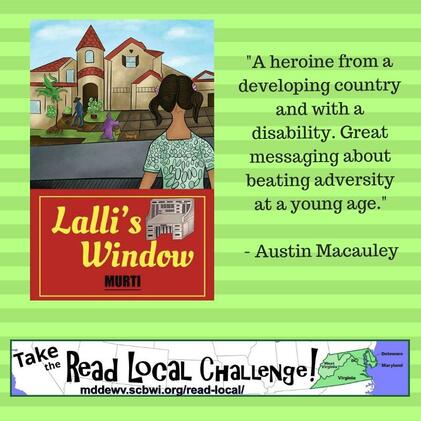 It is heart-breaking at any age to lose a limb. But when it happens to a ten-year-old South-Asian-American girl who had never had to question her privileged life, heart-break leads to a painful confrontation with a variety of prejudices and hate speech. At its core, my story deals with the universal themes of family forgiveness, true friendship, and the power of neighborly love Find Kamakashi on her website, Twitter and Instagram Where to Buy Lalli's Window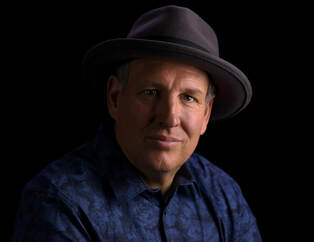 Bret R. Wright is a middle school teacher, freelance writer, and author. A retired Chief Petty Officer, he traveled extensively all over the world while serving in the U.S. Navy, and still enjoys exploring the globe with his wife and youngest son. Wright enjoys running and hiking the trails in the foothills near his home in Monument, Colorado. One of my earliest memories is creating a kidnapping-slash-murder mystery for the neighbor kids to help solve. Now, I was in kindergarten at the time, and they were both much older, but they humored me as they listened to the tape the “kidnappers” left, with instructions to follow the clues to find my missing father (who was at work at the fire station.) This is where I trace the beginnings of my writing career. In that respect, my journey as a writer has been pretty short, as far as genre is concerned. Over time, I’ve experimented with different forms of writing, and ways of presenting the stories I tell. I think challenging yourself is key in growing as a writer. -- voice, genre, style, and perspective -- all of that can be dragged through the sandbox. What comes out is sometimes dirty, it might be barely readable, but, in the end, I think I’ve become a better writer for it. In my day job, I’m a middle school English teacher. Teaching kids how to write comes with the territory, and it’s a part of the job that I really enjoy. One of the best things is this epic short story project I have them do. It’s a long-term thing that runs most of the year, and it teaches the kids about the writing process as a craft. We start at the beginning, with how to write settings, then move to dialogue between characters, and moving a story forward. We talk about pre-writing, research, plotting, -- all the writing things. The lessons become more intricate as the year progresses, and we have a lot of fun along the way. By spring the kids have these wonderful short stories that range somewhere between six thousand and twenty thousand words long. Even the kids who “hate to write” turn in these amazing stories that they’re proud of. I mean, they really are! Those kiddos are part of what keeps me motivated. I get to go back to the basics and remember why I love to write. At least in my case, that’s an important aspect of keeping the creative juices flowing. In addition to my kids, I also get a charge out of just hanging out with other writers. Is there anything more inspiring than spending time with a roomful of writers? Keep your motivational videos and Instagram quotes, and give me some living, breathing authors in a hotel bar at a writers conference any day of the week! Some of the best ideas I’ve ever had have arisen organically from just riffing with other folks in the writing community. I love hearing about projects, ideas, finished manuscripts, and people’s adventures in publishing. I’m not picky about the “kind” of writers I hang with. They don’t have to be genre contemporaries by any means. I have great friends who write romance, poetry, science fiction, spiritual realism, horror -- the whole spectrum, really. The other day I attended an album release party. I didn’t know the artist whose music had just dropped, but I did know some of the poets who attended. Poets really have it going on when it comes to supporting one another. I watched as a good friend of mine tore into her slam poetry performance with a vengeance, and worked that room like nobody’s business. It was awesome, in the most literal sense. I left in complete awe of my friend and her ability with words. I also left with ideas for stories and articles raging in my head, and I had to get them out. I went straight home and wrote until the wee hours, totally invigorated. That has been the fuel of my writing. People are surprised when I tell them I’m actually an introvert. Well, I mean I’m situationally introverted. Classically, big crowds of strangers leave me exhausted but get me around people I know, or in a performance spotlight, and I’m instantly energized, and my head fills with ideas. Locking myself away to write isn’t all that effective unless it’s in the context of a retreat with a couple of other folks. Some people fill their wells in quiet, and I get that, but my charge comes from others, even if all I do is sit quietly in the corner and take in the energy. Do you know who I’d like to hang with? Tim Dorsey and Tom Robbins. Only a voice like Dorsey’s could pull off a main-character like his Serge Storm. A serial killer as the hero who outthinks the bad guys and the cops, and there’s humor? Are you kidding me? Add in the mind of the man who waxes so eloquently absurd about Woodpeckers, Frog Pajamas, and Fierce Invalids. I love the idea of sitting around and tossing out weird ideas and out-there topics. I think it would be a hoot! Nasty People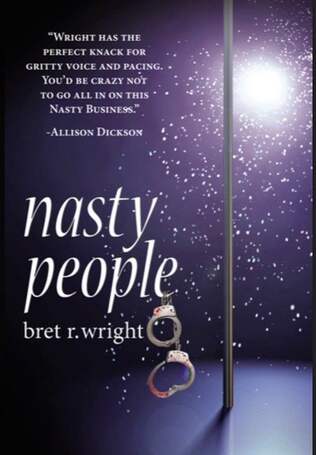 Private Detective Nate "Nasty" Jepson's sense of right and wrong leads him into the dangerous world of human trafficking, where he risks everything to save one man and bring another to justice the only way he knows how: Things get Nasty. Find Bret on Facebook, and Twitter Where to Buy Nasty PeopleKathryn Mattingly has always had a passion for writing. Five of her short fiction pieces have received recognition for excellence and are included in her short story collection, Fractured Hearts. Her literary suspense novels include Benjamin, Journey, Olivia's Ghost, and The Tutor. She has earned a bachelor of arts from the University of Oregon and a master of arts from Pacific University in Forest Grove, Oregon. Kathryn lives on a mountain in Central Oregon with her husband and their two cats. When not penning her next novel, she teaches writing at the local college. 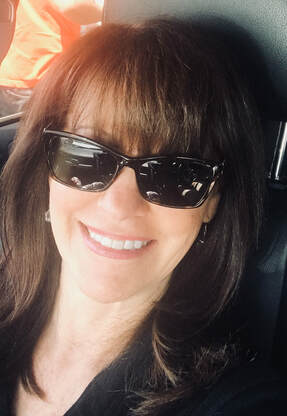 'The Tutor' has a very interesting plot. Where did you get the idea for it? My daughter lived in Roatan for a few years and I visited often. I wrote a detailed journal whenever I was there, knowing one day it would be the setting for my fourth novel. For psychological reasons I have yet to understand, all of my novels involve a child. My heroines are either trying to protect an unusually gifted child from the world at large, adopt a child in a questionable manner, find a missing and presumed dead child, or hide and heal a child that has been traumatized. This, of course, sometimes makes my heroines look more like backdoor villains, unless you closely examine their motives. When constructing the plot for ‘The Tutor’ around a traumatized child, my goals were, as always, to show the resilience, persistence, determination and strength of mothers everywhere, and even more specifically, women. When we set our minds to it, there is nothing we can’t accomplish. Men of course have always known this. I think it’s why they work so hard at trying to hold us back. What will their recourse be once we take over the world? (Visualize an emoji laughing face :) How has your creative process changed with your growth as an author? I work a lot harder at having the reader relate to my heroine from the beginning of the novel. It was a little disconcerting to learn that my heroines weren’t especially likable in the beginning of my books. I’m all for Scarlet O’Hara type heroines, but only to a point. Have you always liked to write, or did this gift reveal itself to you later in life? I have been writing since I could hold a pencil. I had a reputation for sketching seascapes on my math papers and writing stories on the back. I guess I was always subconsciously rebellious toward a school system that doesn’t value right-brained thinkers. Vandalizing my math papers was only one of many ways in which I let my creativity plow over their unimaginative curriculum. Those few teachers who understand me predicted I would write books one day. Do you know what you'll be penning next, and can you share a little about it? My next novel, surprisingly, will also involve a child. This time my heroine wants to get pregnant so badly she overlooks never having loved her husband, just to make it happen. True to my style, a lot of ponderous plotlines are in this book. The story begins in wine country, specifically Napa, California (where we lived the last 2 years until moving back to Oregon). It shifts between there and Central Oregon. All of my books have a couple wildly different settings, and all of them are based on places I have lived or traveled. This might be why settings are considered one of my strengths. There is a little girl in the novel, and I can’t say any more about that without revealing too much. The reader will have to decide if Katia (my heroine) is really in a coma, or has left her physical body and been transported to another time and place. Perhaps both? Part of the suspense involves her villainous husband, and what measures he will take to end her life, whether in a coma, or not. 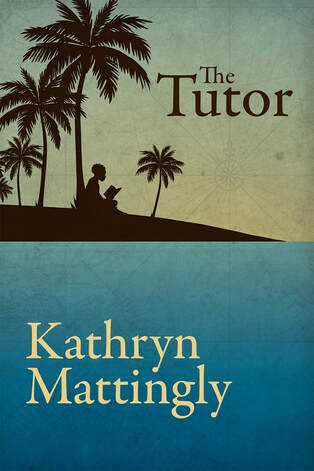 THE TUTUR Natalie (the tutor) is fleeing her unconscionable husband. Matti is fleeing what he witnessed his father do. They end up on the little known island of Roatan, where Natalie’s new friend, Izzy, is fleeing from old island ways that hold women back. Nic, who ends up on the island through a strange set of circumstances, wants to flee his overbearing family. But at what cost will each of them find their redemption? FROM AMAZON REVIEWS Beautiful story of a woman’s journey to empowerment… Love, Betrayal, and Paradise - what more could you want… Lyrical and suspenseful tale of escape and renewal… AUTHOR PAGES
Kathryn and I traded interviews this week. You can read mine on her blog.
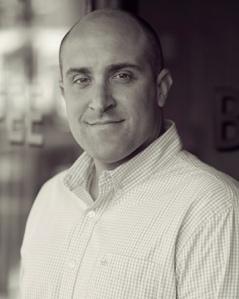 TJ Turner is an award-winning novelist, a historian, a research scientist, and a federal Agent. He has a PhD in Mechanical Engineering and Material Science from Cornell University. As a reserve military officer, he served three tours in Afghanistan and was awarded the Bronze Star Medal twice (2013 and 2017). Angel in the Fog is Turner’s third novel and a prequel to Lincoln’s Bodyguard and Land of Wolves. Turner’s novels have one won the Darrell Award for Best Mid-South Novel, the International Book Award for Historical Fiction, the Best Book Award for Historical Fiction, and the Military Writers of America Gold and Silver Medals. Turner lives in central Ohio, with his wife, Nancy, and three children. Like most authors, I’ve been writing a very long time. I’ve only known a few people who woke up one day, decided to start writing, and were good enough to get those early projects published. In fact, of the few authors I know who fall into this rarefied category of near super-human literary geniuses, I believe all of them (with the exception of one) regret how fast that early success came. That’s not to say that they aren’t grateful for the meteoric rise of their writing journeys, but most were at least slightly pigeon-holed into a genre, or a series, or something that built barriers to their development as a writer. In other words, they never had the chance to really struggle and define themselves through that struggle. So, the first thing I emphasize to any new writer I meet, or anyone years in and still trying to get published, is that the struggle is just as much a part of the creative process. I feel it’s an important part, and it’s ok to try new things, new genres, new characters, new writing styles, as you settle in on your own personal writing journey. I struggled. I still struggle, and I don’t fight it. The struggle forces me to develop and evolve, and I think that with each book my writing gets stronger, my stories get crisper, and my readers more drawn in to the world and characters I create. I started off writing short stories—science fiction. And they were horrible. I didn’t understand how a story arc should work. I didn’t understand how a character should grow and change. I tried to write very literary science fiction, which if it even exists, has got to be the smallest sub-genre in the world. My writing reflected my reading world at the time, limited to Isaac Asimov with the occasional jaunt into Robert Heinlein. It wasn’t until I started reading more widely and discovered just how much I loved fiction of every flavor—and non-fiction, too! I found myself drawn in by American history, alternating a novel (Cold Mountain, Enemy Women, The Things They Carry) with great non-fiction (Bury My Heart at Wounded Knee or Liar, Temptress, Soldier, Spy). It took me a while to realize that while I liked science fiction, I was curious about American History. That little word—curiosity—is so important. Andre DuBois III says it best—a writer needs authentic curiosity. (If you ever get a chance to see Andre talk about writing, jump at it, or look up the many YouTube videos where he talks about his creative process). What Andre means is that you as the writer will be living with this project for 6 months, or a year, or 3 years, and you have to not only be curious enough to start the work, but you have to be authentically curious enough to pull it all together and finish. Your story and your characters have to compel you to write, to drive you to the page so you can find out what happens to them. When that happens, all that passion will come out in your writing. So, I pivoted from science fiction to historical fiction—the literary equivalent of switching from basketball to ballet. And with the first words of that very first novel (LINCOLN’S BODYGUARD), I knew I had found my place—at least temporarily. It was a challenge to fit my story into actual history—to discover voices that might otherwise be lost and try to bring them to light. Unlike science fiction where I had to build a world from scratch, my world was laid out in the history texts we all know and love (?). I now had license to concentrate on my characters, and weaving in an interesting story through the fabric of American history. Even after finding my genre (or at least the one I’m writing right now), I’ve found there are still ways to grow as a writer. My first two novels were told in first-person with a male narrator. In some ways that was an easy out for me—someone to whom I could relate. But for my third book, I needed something different. In fact, my wife Nancy helped push me down this path. She wanted a book about Molly—my female protagonist. And I wanted a book my daughters could read and find a character they could draw inspiration from—a strong, intelligent female lead who not only lives but thrives in the male world of 1862 America. Even though I am biased, I think ANGEL IN THE FOG delivers upon that promise. I feel it’s my best writing yet, because I struggled outside my comfort zone. In truth, I was worried about creating a book with a female lead—to write authentically from Molly’s perspective. So, it may be unsurprising that the novel is told in third-person. That choice gave me a little distance between Molly and me as the writer. Some people have strong feelings on narrative point of view, but I like to think of them as tools. I use whatever the story needs. And so, with the publication of Molly’s story this April, I’ve turned to a new project—a female protagonist who is telling me her story in first person. This new character is pushing me even further, and hopefully an even better writer will emerge! Angel in the Fog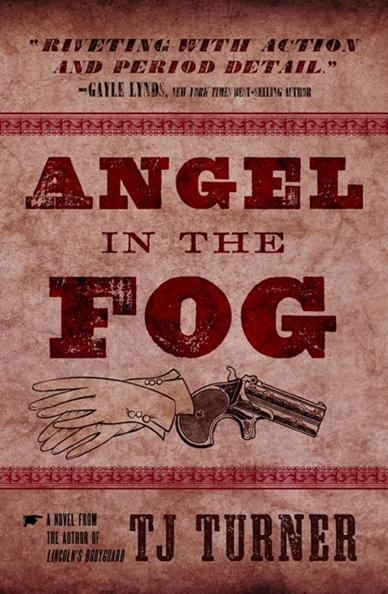 Perfect for fans of espionage thrillers, historical fiction, and indefatigable female protagonists― Molly Ferguson’s comfortable life unravels when her Louisiana home is burned to the ground, her family murdered, and she is enslaved in a Baltimore brothel. Amidst the threat of the Civil War, Molly learns of secessionist plans to assassinate President-elect Abraham Lincoln as he makes his way to Washington for his inauguration. She’s manages to pass this information on to a Pinkerton agent posing as a client. Impressed with her fortitude and intelligence, the Pinkerton Agency arranges for Molly’s freedom and brings her under the tutelage of Mrs. Kate Warne, America’s first female detective. After they save Mr. Lincoln in Baltimore, Molly is sent by the Pinkerton Agency into the Deep South―where the Civil War now rages―a spy behind enemy lines. Molly threads a thin line between revenge and redemption as she races to unravel a sinister plan that will doom the Union and allow the Confederacy to win the Civil War―while coming face to face with the demons from her tragic past. Find TJ at his website, Facebook and Twitter Where to Pre-Order Angel in the Fog |
AuthorI'm generally pulled in a million different directions and I wouldn't trade it for the world. Here's a glimpse of my life - hope you enjoy it! And if there's a big lapse between posts, well, that's the way life goes in Amy's world. Archives
October 2022
Categories
All
|
|
Copyright 2024 by Amy Rivers. All rights reserved. |
 RSS Feed
RSS Feed